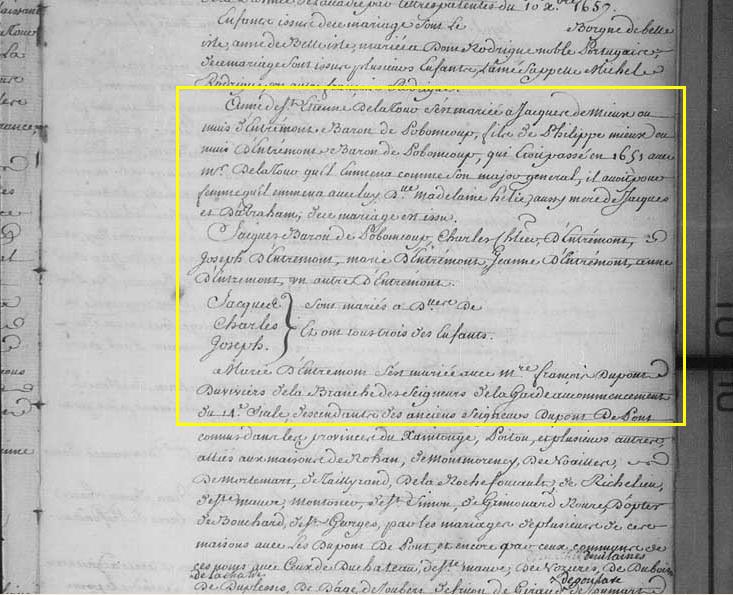
Claude Antoine De’meullon
Date of Birth
1568
Place of Birth
Marseille, Provence-Alpes-Côte d'Azur, France
Towns / Cities Moved Into
Marseille, Provence-Alpes-Côte d'Azur, France |
Rhône-Alpes, France
Known Occupation
-
Religion
-
Death Information
Year of death
February 26, 1618
Place of death
Rhône-Alpes, France
Cause of death
-
Obituary

Parents

Nicholas Mius D' Entremont

Jeanne DeMeullon
Marital Status


Married Béatrix de Coligny
30 November 1600
Savoie, Rhône-Alpes, France
Siblings

















Children




Narrative / Story
In the year 1568, the vibrant city of Marseille in Provence-Alpes-Côte d’Azur, France, witnessed the birth of Claude Antoine De’meullon, a child destined to leave a significant mark on his era. Born into a family of prominence, his father, Governor Nicolas Mius, served as the esteemed governor of Marseille, positioning Claude Antoine in a world of influence and responsibility from the outset.
Claude Antoine’s upbringing was deeply intertwined with the religious and political dynamics of his time. France, then embroiled in religious wars, experienced a pivotal moment in 1598 with the issuance of the Edict of Nantes under King Henry IV. This edict, granting religious liberty, brought an end to the longstanding conflicts and fostered an atmosphere of relative tolerance, undoubtedly shaping Claude Antoine’s worldview.
In 1600, a new chapter began in Claude Antoine’s life as he married Béatrice De Coligny D’Entremont. Their union, celebrated in Savoie, Rhône-Alpes, marked the beginning of a journey filled with love, family, and responsibility. Together, they raised four children: Philippe Mius D’Entremont, Marguerite D’entremont, Francois Virginie De Meullon, and the Baron De Natage.
Known variously as Claude-Antoine Mius de Meuillon de Montmuran and Sieur d’Albon, Claude Antoine’s names reflected his noble lineage and societal status. As the son of a governor, he enjoyed socio-economic privileges and opportunities, which likely included managing his family’s estate and possibly serving in administrative roles within the region. His responsibilities as a nobleman would have extended to overseeing the welfare of those on his land, supporting the local community, and upholding the law.
Claude Antoine’s life was also shaped by the broader historical events of his era. The reigns of Louis XIII and Louis XIV were times of peak royal power in France, marked by political and cultural dominance in Europe and the initiation of large-scale sea trade. These developments connected France with distant lands, bringing about significant changes in trade and cultural exchange.
Despite their noble status, Claude Antoine and his family might have faced challenges and discrimination, possibly due to their religious beliefs or political affiliations. The socio-economic landscape of the time was riddled with complex power struggles and shifting alliances among the nobility, which could have impacted their lives in various ways.
Living through a period of great transformation in France and Europe, Claude Antoine’s story is one of social standing, responsibility, and cultural engagement. He witnessed the resolution of religious conflicts through the Edict of Nantes and the prosperity and expansion of French influence globally.
On February 26, 1618, Claude Antoine De’meullon passed away in Rhône-Alpes. His legacy, interwoven with the history of Marseille, Savoie, and the significant events of his time, left an indelible mark. His contributions as a nobleman and his involvement in local and national affairs render him a notable figure in the historical tapestry of France, spanning the reigns of Henry IV, Louis XIII, and the rise of Louis XIV’s dominant rule.
